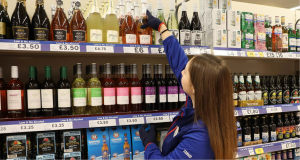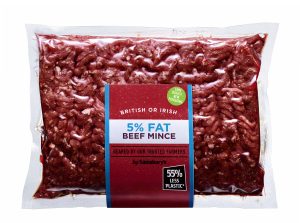As we near the end of 2023, Grocery Gazette takes a look back at five of the biggest food and drink trends of the year.

With the cost-of-living crisis raging throughout 2023, many shoppers switched from branded goods to supermarkets’ cheaper own-label lines.
In March, data from consumer research platform Attest found that just over 70% of Brits plan to keep buying supermarket own-label products over big-name brands even as inflation eases.
It is understandable therefore why supermarkets have been revamping and expanding their own-label offerings into more exotic options.
In September, after having seen “considerable demand for Japanese foods,” Waitrose launched a new own-brand food range – Japan Menyū – with products spanning ready meals, centrepieces, sides and snacks.
A month later, Asda launched Bom Bahia – which was first launched onto shelves earlier this month – a premium Indian offering dishes created using authentic cooking methods and traditional recipes as part of a £19.5m own-label overhaul.
Meals such as Slow Cooked Beef Madras and a Black Dal we’re introduced.
It also debuted House of Yum, an elevated pan-Asian offering designed as the perfect ‘fakeaway option’ with Char Siu Pork, Slow Cooked Beef Massaman and Jasmine Sticky Rice and more.

Supermarkets across the board have increasingly targeted food-to-go as time-poor shoppers are increasingly looking for quick meal alternatives.
Earlier this year, Tesco CEO Ken Murphy told Grocery Gazette that food-to-go is a “real growth area” for the supermarket giant, adding that it has launched over 155 new products in the category since April.
In August, Sainsbury’s debuted a new premium ‘Kitchen Deli’ fresh food-to-go range in 100 stores offering products such as wraps, sandwiches, salads and ready meals and, in the same month, Asda unveiled a new food-to-go trial with the ‘Asda Food Hub’, which includes a wider range of sandwiches, wraps, salads and snacks in certain stores.
This came alongside a £1.2m revamp of the Asda’s traditional food-to-go range, with the addition of 47 new products including a deli-style offering.
In September, Waitrose executive director James Bailey said meal deal sales at the upmarket retailer have tripled year-on-year, following the launch of its first £5 lunchtime meal deal offer this summer, which was “already selling twice as much as we expected after two weeks”.
Demand for hot food-to-go items has also increased this year as Pret launched its biggest hot food offer to date and Scotmid co-operative head of food-to-go Danny Scobie said hot food is the convenience retailer’s “biggest opportunity” right now.

No and low-alcohol beer spiked to 4.6% of the beer market in January 2023 compared to 4% in January 2022, with most of the growth having come from new products adding value to the category such as Peroni Nastro Azzurro 0.0% and Guinness 0.0%.
In August, Waitrose partnered with beverage giant Diageo to introduce dedicated areas that offer the retailer’s full range of over 70 low and alcohol free drinks in 253 stores across the UK.
This gave 60% more space to these products and came after sales of no and low alcohol drinks grew 20% over the past year at the retailer.
Tesco is now predicting record demand for no and low alcohol beer, wines and spirits this Christmas as it has seen its strongest ever sales in 2023.
The supermarket giant cited newfound shopper confidence in the quality of drinks, greater interest in health, an increase in product choice and ease of selection in stores with all products sitting in their own fixture as the main reasons for the boom.
According to Nielsen, celebrity-owned alternatives have also added to the success of the category as pop star Kylie Minogue’s 0% Sparkling Rose has become one of the UK’s top-selling premium no alcohol wines.

Shrinkflation – when a product is reduced in size, but the price remains the same or increases – has become a widely used retail tactic across the grocery sector over the past year as brands look to counter soaring production costs.
While many major brands claimed to have shrunk their products rather than switch to cheaper ingredients to ensure the same quality and taste, research from Barclays found that as a result, 21% of consumers are switching to brands that have not reduced the size of items.
Some of the most notable products that have fallen victim to shrinkflation include confectionery giant Mars’ Galaxy Smooth Milk chocolate bars which were slimmed by 10g to 100g at the same time that its price was hiked.
In February, McVitie’s Digestives were cut from 400g to 360g, while multi-packs of Penguin bars and Club biscuits were reduced from eight items per pack to seven at a time when Russia’s invasion of Ukraine pushed up the cost of commodity crops such as wheat and vegetable oils that are widely used in the manufacture of biscuits.
Arla Foods butter brand Lurpak cut its 250g packs by 20% to 200g across its salted, unsalted and ‘lighter’ block varieties in May and in the same month, Hellmann’s mayonnaise jars were slimmed down from 800g to 600g.
At the time, the 600g jars were priced at £3.75 in Tesco, however the previous 800g version cost £4.30, which equates to 9p more per 100g.

Throughout 2023, the grocery sector has applied much innovation to create more sustainable packaging solution.
Although Sainsbury’s came under fire for its vacuum packed mince over the year, it was a move replicated by Co-op, Aldi and Lidl that cut down on plastic usage substantially.
Tesco’s alternative mince ‘pillow pack’, which is slightly inflated so prevents the mince from being compressed, was better received by customers and still used 70% less plastic.
At the time, Tesco commercial director for fresh Dom Morrey said: “Pillow packs are a win-win: they keep the mince in perfect condition while requiring much less plastic.”
Meanwhile, both Tesco and Waitrose launched compostable, plant-based teabags over the year.
Refillable products also continued to grow as Waitrose became the first UK supermarket to introduce a refill pouch for olive oil this year.
Consumers can buy glass bottles of the oil and then refill it with pouches, which have a carbon footprint that is fifteen times lower than glass bottles.
Elsewhere, The Co-op used technology in its packaging to improve recycling visibility.
The retailer has partnered with Polytag to apply unique-every-time QR codes and UV tags to its own-label PET 2-litre spring water bottles, which provide The Co-op with real-time insights on whether packaging is actually recycled, and in what volumes.